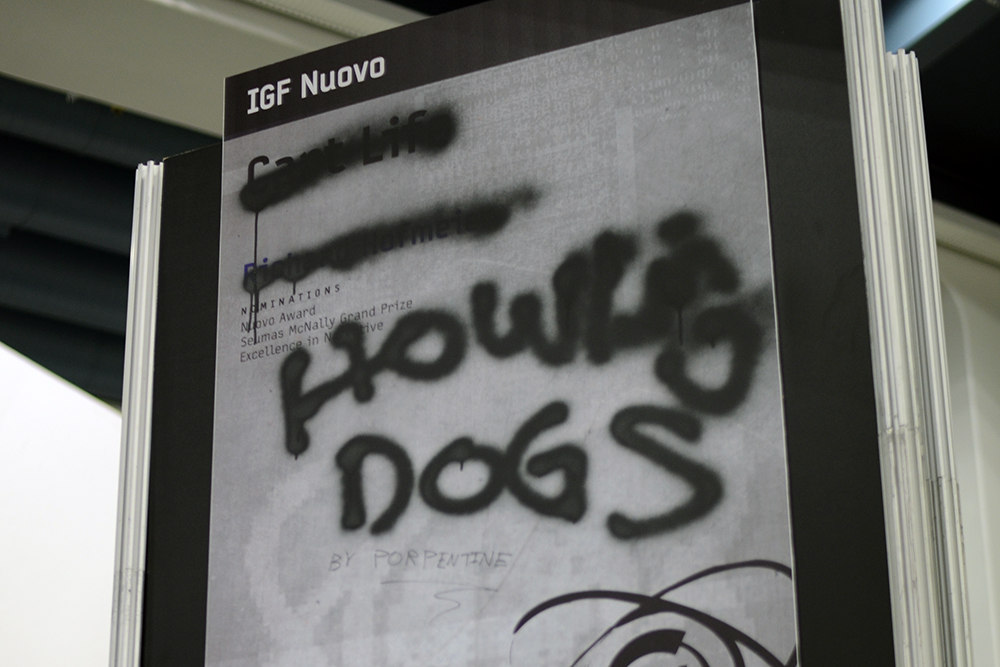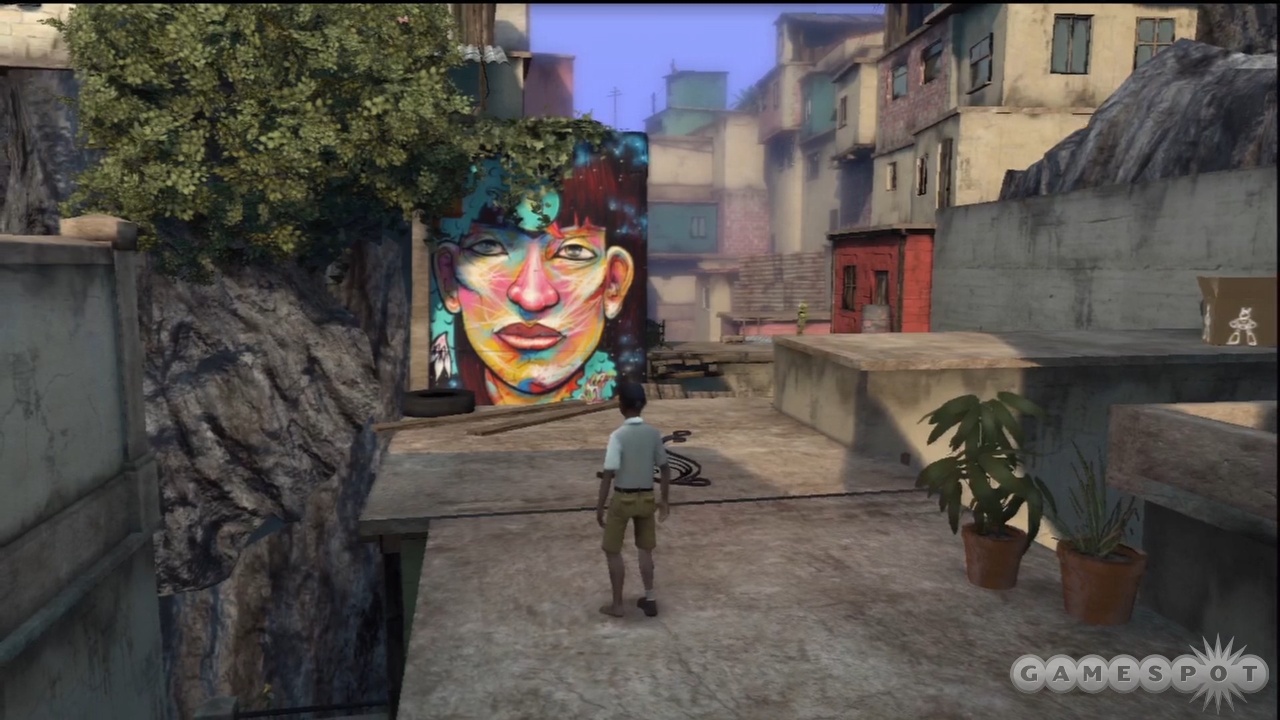An Industry Divided
At this year's Game Developers Conference, many people spoke out in support of a more equitable and inclusive gaming industry. But it's clear that there's still a great deal of resistance to this perspective.
It was a gesture that beautifully encapsulated so much of what last week's Game Developers Conference was about for me. After his game, the socially conscious retail simulator Cart Life, had won numerous accolades at Wednesday night's IGF Awards, Richard Hofmeier replaced Cart Life with Howling Dogs, a game by designer Porpentine, on the computer set up to demonstrate the game at the IGF Pavilion on the show floor. No longer feeling as if his game needed the attention, he took the opportunity to shine a light on a game created using Twine, making a clear statement in support of the notion that Twine games are legitimate games worthy of serious consideration. And the selection of Howling Dogs in particular says that the creative work of a self-identified queer tranarchafeminist like Porpentine should be showcased and engaged with and celebrated just as much as the work of any other creator or the members of any other group.
My encounter with Hofmeier's act on Thursday evening capped off a few days of wonderfully encouraging talks about reclaiming games as an inclusive space for all kinds of players and all kinds of expression. On Wednesday, I'd attended the #1ReasonToBe panel. Inspired by the #1ReasonWhy and #1ReasonToBe Twitter hashtags, which had gained momentum and garnered attention last November, the panel featured six extraordinary women who shared their perspectives on life as women who play, create, and write about games. The day prior, I'd heard Halo: Reach writer Tom Abernathy talk about how games offered so few heroes his daughter could see herself in; at this panel, writer Mattie Brice lamented that, to see herself reflected in a game character, she'd had to make her own game, Mainichi. If a novice like her could whip up a game with a character in which she could see herself in a week, she wondered, couldn't those who make games professionally sometimes give her options that would let her see herself in them?
If you don't have some sort of balance within your games, Gaider asked, what sort of message are you sending about who is welcome to play your games?At the same panel, game designer Brenda Romero passionately and humorously excoriated the atmosphere of the Electronic Entertainment Expo, one of the most visible manifestations of the industry's lingering unwillingness to treat women as equals. Romero made it clear that her problems aren't with displays of sexuality or healthy sexual expression, but with the creation of a sexually charged atmosphere that favors the perceptions and desires of men and objectifies women. Romero's passion for the industry runs deep. "It is my calling. My friends. My family. My home," she said. Now, one thing her 12-year-old daughter dreams of doing is making a game with her. Romero pleaded for E3 to be changed so that it could be the sort of place that she could take her daughter to and be proud of.
Of course, many don't understand why the presence of booth babes, or the widespread marginalization and objectification of women in games, is a problem at all. In his talk on Thursday, BioWare writer David Gaider addressed this issue. It's about privilege. As Gaider summed it up, privilege is when you think something is not a problem because it's not a problem for you personally. He brought up a post that made some waves in the BioWare forums in March of 2011, in which a player expressed outrage at being confronted with a gay romance option when playing Dragon Age: Origins. He asserted that BioWare was defying the wishes of its straight male fan base by including such romance options. "It's ridiculous," the player wrote, "that I even have to use a term like Straight Male Gamers, when in the past I would only have to say fans." To this player, as Gaider put it, the fact that there might be options in Dragon Age that appealed to other types of players was not a quality but an imbalance of the natural order. Straight male gamers are still at the top of the totem pole when it comes to having games that cater specifically to their interests, and to some of them, things like gay romance options represent a diluting of the purity of gaming that, by rights, should belong solely to them.
BioWare is well aware, though, that many of its fans aren't male and plenty of them aren't straight. If you don't have some sort of balance within your games, Gaider asked, what sort of message are you sending about who is welcome to play your games? He urged game makers to ask themselves questions when making a game: Could this character be female? Could they be black? Could they be gay? And if you're worried that maybe you don't know how to write characters who belong to groups that you don't belong to, talk to people who do belong to those groups. Hire them. Listen to them.
GDC week offered a portrait of an industry in conflict with itself, both in terms of how it sees itself from the inside and in terms of how players see it.I confess, I got goose bumps during both the #1ReasonToBe panel and Gaider's talk. Hearing an inclusive vision of the industry championed so powerfully by Brenda Romero, David Gaider, and others was profoundly encouraging to me, as someone who has always felt that games should be for everyone. But these past few days have also provided plenty of reminders of the deeply rooted problems plaguing the industry. On Tuesday, Crystal Dynamics employee Meagan Marie recounted in her blog a mortifying experience that happened at the previous week's PAX East, and how it was no isolated incident, but simply the latest in a long string of objectifying treatment she has both witnessed and experienced over the past several years. On Wednesday night, almost as if to underscore just how widespread and thoughtless the devaluation of women throughout the industry that Brenda Romero had criticized is, a party thrown by the International Game Developers Association employed scantily clad women dancers as entertainment. This led Brenda Romero to resign as co-chair of the IGDA, and Christa Charter, a former Xbox community manager with 17 years of experience in the industry, to write frankly about her own encounters with sexism.
So in some ways, GDC week offered a portrait of an industry in conflict with itself, both in terms of how it sees itself from the inside and in terms of how players see it. During the #1ReasonToBe panel, Mattie Brice talked about how, when games like her own Mainichi, Anna Anthropy's Dys4ia, and other nontraditional games are used in non-gaming-related classes, responses to the experiences they offer are positive, and peoples' notions of what games can communicate are broadened. But when such games are shown in game studies classes, Brice continued, they tend to be viewed as not games at all due to their lack of traditional elements. Brice questioned whether we want to prime the people who will make games to have such a narrow interpretation of what games are, saying that such a limited interpretation can only strangle our industry's potential for creativity. I worry about this, too.
But I'm hopeful now, more hopeful than I've ever been, that the future of gaming will be more inclusive and diverse than its past. I don't think the road will be smooth or easy, but there's reason to believe this is a battle worth fighting. That reason was in Papo & Yo designer Vander Caballero's talk as he lamented that games are part of the reason children today know what an AK-47 is, and how his story shows that you can make games without being part of that system, games designed to nurture and heal. That reason was in the unwavering confidence of Brenda Romero, whose contributions to gaming date back to Sir-Tech's landmark Wizardry role-playing games of the early 1980s, as she shouted, "I founded this fucking industry, motherfuckers!" That reason was in Anna Anthropy's righteous anger as she seethed and raged her way through a version of Cara Ellison's poem "Romero's Wives." And it was in the sign at the IGF Pavilion on the show floor that had once touted Richard Hofmeier's Cart Life, but had been vandalized by Hofmeier himself to celebrate Howling Dogs by Porpentine.
Every voice that speaks out in favor of diversity or against the marginalization of women and minorities can help contribute to the cultural shift this industry needs.Obviously, it's not enough yet. It's not even remotely close to being enough. The idea of a more diverse and inclusive industry needs to radiate out from these GDC talks and gestures; it needs to manifest itself in more equitable and welcoming atmospheres at conferences like E3, in the design of games, and in the messages the characters and content of those games send to players about who games are for. It's still an uphill battle, and if you believe in it, then you should speak up, too, in conversations and in message board comments, wherever you can, because every voice that speaks out in favor of diversity or against the marginalization of women and minorities can help contribute to the cultural shift this industry needs. The more momentum this movement can build, the better, but it now seems pretty clear: those of us who see gaming as a place that should welcome all kinds of players, all kinds of designers, and all kinds of experiences are here to stay.'
Got a news tip or want to contact us directly? Email news@gamespot.com



Join the conversation